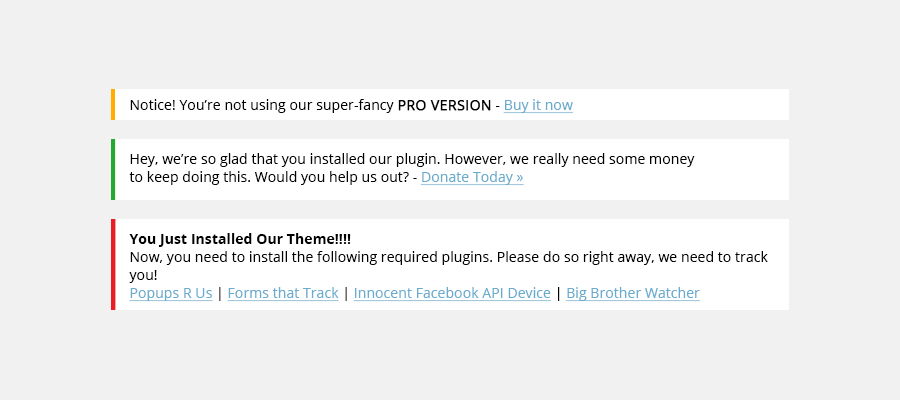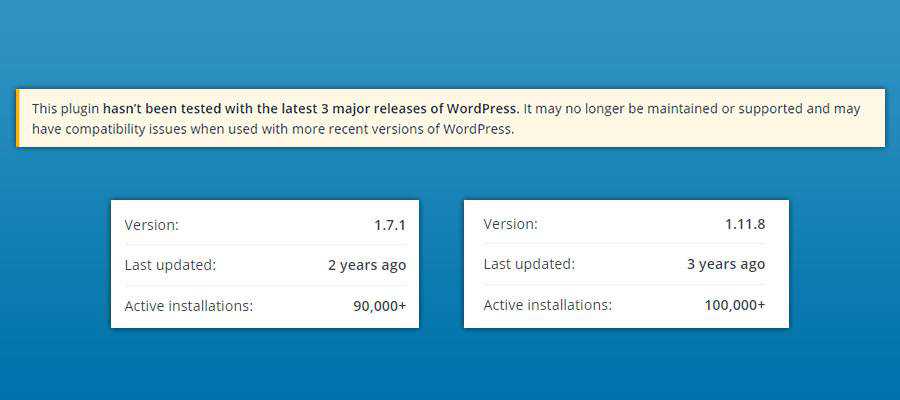The Grumpy Designer’s WordPress Plugin Pet Peeves
Believe it or not, a great WordPress plugin is something that can make me smile. If it’s particularly cool, helpful and time-saving, well, I might even become somewhat giddy.
For instance, when I first became a user of Advanced Custom Fields and Gravity Forms (and yes, I gladly pay to use each of them), I was blown away by what these plugins were capable of. Both opened up a new world of possibilities in terms of what I could offer clients. Beyond that, each had strong developer communities to extend their capabilities even further.
Still, WordPress plugins can also bring the opposite reaction. Some aren’t very reliable and shouldn’t be used in a production environment. Others work well enough, but have persistent bugs or features that bug the heck out of me. Worse still is when a formerly-useful product goes the way of the dinosaur.
In all, there are a number of plugin behaviors that have become pet peeves over the years. Here are a few of the more egregious – in one grumpy designer’s mind, at least.
An Endless Barrage of Notifications
There’s nothing quite like logging into WordPress and seeing a plugin notification to get the old heart racing. What could it be? Is something broken? Did I forget to renew that license? Oh, they just want me to buy something else. And give them a 5-star rating. Then click to learn more about their new-but-unrelated product.
We all need to make a living – I get it. Notifications are a means to an end, one of the few ways to get your message across in the dashboard.
If only one or two plugins did this, maybe the experience wouldn’t be so bad. But the issue is much more widespread. It seems like the majority of plugins are offering up notifications for things I don’t want to be notified about. Even commercial products that I’ve paid for are doing it.
The worst of all is when you take the time to dismiss a notification, only to see it come back the next time you log in. Isn’t once enough? I’ve felt less pressured on a used car lot. At least you can shoo the salesperson away if need be.
The result is a polluted dashboard, where important information is buried underneath sales pitches. Instead, maybe plugin developers could dedicate a separate page that includes whatever they want us to know (like the welcome screen used by WordPress itself)? It’s there if we want to see it. Otherwise, users don’t have to be bothered.

Official Plugins That Slowly Wither Away
Installing a new plugin is always an unpredictable experience. But it’s much easier to be confident when that plugin has a history of being well maintained. It’s also nice when you see its support forums showing regular engagement from the developer.
It’s understandable that some plugins just aren’t going to be maintained over the long haul. Yet, it’s particularly frustrating when that plugin is an official product that interfaces with a third-party service.
I’ve run into a couple of instances and, amazingly, they’re both competing products. I won’t name them except to say they are email delivery services (search the repository, they’ll be fairly easy to guess). As of this writing, neither plugin had seen an update in at least two years. Combined, they count nearly 200,000 active installations.
As you might imagine, a lot has happened in that span. For one, WordPress 5.0 and the Gutenberg block editor were introduced. Meanwhile, these plugins have become long in the tooth. In addition, some features no longer work as intended.
Both vendors continue to sell pricey services, but their official plugins languish. With the massive number of sites powered by WordPress, it seems foolish to ignore this market.
They should at least make an effort to keep things up. Even the occasional bug fix could go a long way towards instilling confidence.

Lackluster Support for Commercial Plugins
When it comes to functionality, there is a ton of diversity among WordPress plugins. They can be incredibly broad, do-it-all suites or tiny niche masterpieces. The level of support for these products can vary just as widely.
The truth is that some plugin authors provide higher levels of support. I’ve had great experiences with both free and commercial offerings. Developers who are prompt, thorough, polite and willing to help. They take their responsibilities very seriously.
Then there are those who, for one reason or another, just don’t provide that same level of service. Now, this is completely understandable when it comes to free plugins. These products are side gigs in many cases, and we shouldn’t reasonably expect anyone in that situation to respond immediately.
Where it becomes frustrating is in the commercial space. A plugin you have paid for should (in theory, at least) come with more attentive support. Unfortunately, that’s not always the case.
Among the worst practices are support tickets that go unanswered for days. It’s especially difficult when the issue is with an eCommerce-related plugin. A buggy store could be a real revenue killer and erode consumer trust. Being stuck waiting for a reply from technical support doesn’t help the situation.
Part of this speaks to the challenge of running a business. For companies that hire support technicians, it can be difficult to find and keep good people. Still, the bottom line is that poor service in this area can make you think twice about renewing that plugin license.

Honorable Mentions
Not every pet peeve is quite deserving of an entire section – but still worth a shout out. Here are a few that only feel like an occasional punch to the gut:
Commercial Plugin Update Fails: You enter the license key, activate it and everything’s great, right? Then, for reasons unknown, applying updates fail. Maybe not every time, but often enough to drive you crazy.
Once, Twice, Three Times an Update: A plugin releases an update and you successfully apply it. Woohoo! Except it contained an unintended issue that requires another update a half hour later. Especially fun when you manage multiple websites.
Disorganized Settings: When a plugin has a lot of settings, the process of tweaking them is so much easier if everything is well-organized. Hint: A massive, single page worth of hard-to-read options doesn’t fit the bill.
That’s it for this list! Have any of your own WordPress plugin pet peeves (or maybe “ungrateful user” pet peeves if you’re a developer)? Hit me up on Twitter and get it off your chest.